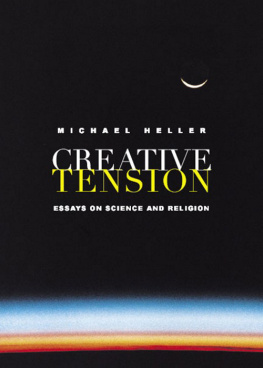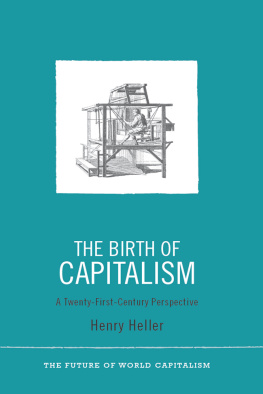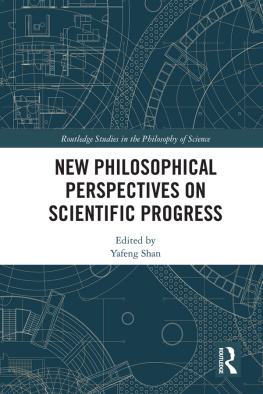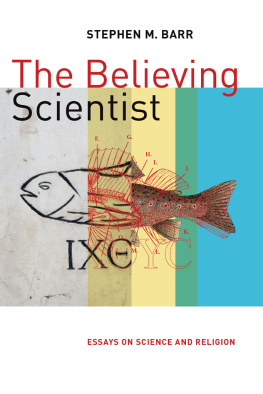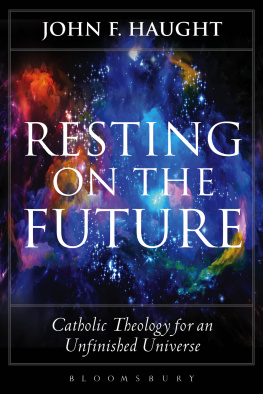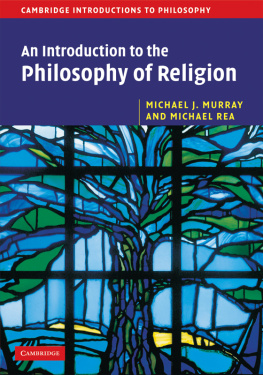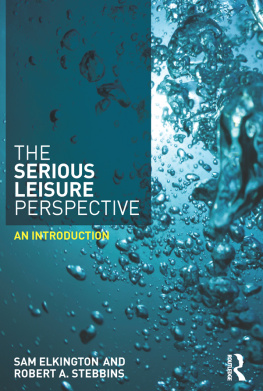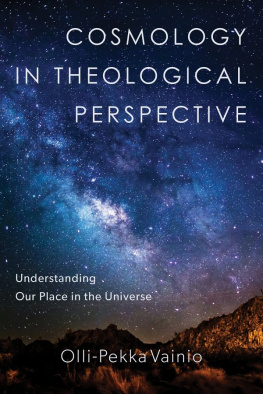CREATIVE TENSION
MICHAEL HELLER

ESSAYS ON SCIENCE AND RELIGION
TEMPLETON FOUNDATION PRESS
WEST CONSHOHOCKEN, PENNSYLVANIA
Templeton Foundation Press
300 Conshohocken State Road, Suite 670
West Conshohocken, PA 19428
www.templetonpress.org
2003 by Michael Heller
All rights reserved. No part of this book may be used or reproduced, stored in a retrieval system, or transmitted in any form or by any means, electronic, mechanical, photocopying, recording, or otherwise, without the written permission of Templeton Foundation Press.
Designed and typeset by Kachergis Book Design
Printed in the United States by Versa Press
Library of Congress Cataloging-in-Publication Data
Heller, Michael.
Creative tension : essays on science and religion / Michael Heller.
p. cm.
Includes bibliographical references and index.
ISBN 10: 1-932031-34-0 (pbk. : alk. paper)
ISBN 13: 978-1-932031-34-8 (pbk. : alk. paper)
ISBN: 978-1-599472-09-6 (ebook)
1. Religion and science. I. Title.
BL240.3.H45 2003
261.55dc21
2003012637
08 09 10 11 12 10 9 8 7 6 5 4 3 2
CONTENTS

FOREWORD

Among those scholars who foster interdisciplinary dialogue between religion and science, two basically different styles of research have been practiced by scientists and by philosophers. The members of the first group feel at home with the mathematical formalism of new scientific theories but when they try to determine the philosophical significance of these theories their comments very often become naive and arbitrary. The representatives of the second group frequently focus their attention on methodological principles and logical distinctions but they know the essence of scientific procedures mainly from popular reports on new discoveries in physics or biology.
There are a few contemporary authors who are skillful enough to use the sophisticated language of modern mathematics and to assess competently the differences between, for instance, Augustine and Aquinas in their understanding of evil. According to historians, Leibniz was the last intellectual authority who comprehended the entire knowledge of his epoch. It was he who dreamt of a mathesis universalisa universal mathematized language in which all philosophical problems could be formulated and solved. Professor Michael Heller does not share old Leibnizian dreams because he knows well the consequences of Kurt Gdels incompleteness theorem that rules out finding a nontrivial logical system in which all questions could be answered. Nonetheless Hellers original contributions are appreciated both in physics and in ontology. His papers can be found not only in such scientific periodicals as the Journal of Mathematical Physics or General Relativity and Gravitation but also in philosophical Festschrifts dedicated to Wittgenstein or Teilhard de Chardin.
In his contributions to physics, the author of Creative Tension organized in Cracow a group of talented and young collaborators who originated their joint research by discussing the problem of initial singularity in cosmological models. This very problem inspired long-lasting philosophical debates about whether the initial cosmological singularity could be regarded as the absolute zero of time. In continuing this research, Professor Heller tries to use the so-called noncommutative geometries as a new language in which one could describe both quantum and cosmological phenomena providing a new paradigm for unity in physics. In philosophy, he develops novel ideas to present a new version of Platos ontology; the rational structure of reality that could be described in the language of mathematics seems for him much more important than the physical substratum. Consequently, in his ontological version of the so-called formal field theory, he argues that the world of observable physical parameters belongs to the domain of Platonic shadows, while the essence of reality is constituted of abstract relations and formal structures that can be described only in the language of sophisticated mathematics.
Michael Hellers fascination with religion originated in Siberia where, as a child, he was in exile with his family during World War II. Immediately before the war, his family lived in the eastern part of Poland, which was occupied in September 1939 not by the Nazis, but by the Soviet Army. Born in 1936, he returned to his native Poland after the end of the war, when he was nine years old. The struggle for survival in the severe conditions of Siberian life, as well as his personal experience of the important role of religion in such conditions, directed the attention of the young boy to religious issues. He knew that many people survived the extreme Siberian situation because they found in prayer both their spiritual force and their will to survive. His main dream after coming back to Poland was to become a priest and to help people in finding solutions to the most basic problems of life.
Science turned out to be his second intellectual fascination. When after his priestly ordination he undertook philosophical studies at the Catholic University of Lublin, he subsequently developed his own style of doing philosophy in interdisciplinary dialogue with modern science. His attention focused upon such issues as the very beginning of the universe, cosmic evolution, the nature of time, the existence of mathematical objects, and the preconditions of using mathematics in the description of physical processes. His close cooperation with prominent scientists, as well as his own creative efforts, resulted in his quickly becoming well known as one of the best European cosmologists and an outstanding philosopher who consistently tries to develop philosophy in the context of new scientific discoveries.
Hellers attempt to foster dialogue between science and religion grew up in the specific situation of the totalitarian system in which Marxism was officially recognized as the only scientific philosophy. Ideological protection for philosophical systems very often results in skeptical distrust toward the protg; scientists in Poland also displayed total distrust toward Marxism. When genetics and cybernetics were criticized by the Communist Party functionaries as pseudoscience and Niels Bohrs interpretation of quantum mechanics was rejected by Soviet academics as reactionary, there was among the Polish scientists a natural openness to the philosophical implications of scientific theories that could be defined without ideological bias. At that time the Church created a sphere of freedom where alternatives to the Marxist interpretations of scientific discoveries were freely discussed.
Already in the 1960s the then Archbishop of Cracow, Karol Wojtyla, expressed his support for this kind of research. From time to time, he used to invite to his episcopal residence scientists, philosophers, and theologians to discuss with them such topics as the ethical issues generated by new scientific technologies or the role of physical theories in reinterpreting the classical Thomistic arguments for the existence of God. In October 1978, when Cardinal Wojtyla was elected the Pope and had to remain in Rome, Michael Heller took care of this interdisciplinary group and continued its meetings, organizing them systematically once a month. When social transformations, inspired by the rise of Solidarity, facilitated international contacts, many prominent scholars from the West were invited to take part in the Cracow interdisciplinary seminars. Among those who at that time visited Copernicuss city to discuss the philosophical and theological importance of modern science were Arthur Peacocke (Oxford), John Polkinghorne (Cambridge), Charles Misner (Maryland), Ernan McMullin (Notre Dame, Indiana), William Wallace (Washington, D.C.), Jean Ladrire (Louvain) and Carl Friedrich von Weizscker (Germany).

